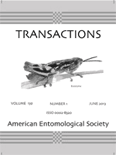
TRANSACTIONS OF THE AMERICAN ENTOMOLOGICAL SOCIETY
Scope & Guideline
Illuminating the Complexities of Insect Life and Behavior.
Introduction
Aims and Scopes
- Biodiversity and Taxonomy:
The journal publishes articles that contribute to the knowledge of insect biodiversity and taxonomy, including the description of new species and revisions of existing classifications. - Ecological and Zoogeographical Studies:
Research focusing on the ecological roles of insects and their distribution patterns in various geographical regions is a core area, providing insights into the interactions between insects and their habitats. - Morphological and Anatomical Research:
Studies on the morphology, anatomy, and ultrastructure of insects are prominent, contributing to the understanding of insect physiology and taxonomy. - Conservation and Environmental Impact:
The journal addresses the conservation status of insect species and the ecological impacts of environmental changes, reflecting a commitment to understanding insects in the context of biodiversity loss and habitat degradation. - Interdisciplinary Approaches:
The incorporation of molecular techniques, acoustic analysis, and ecological modeling in insect research highlights the journal's support for interdisciplinary methodologies that enhance entomological studies.
Trending and Emerging
- Molecular and Genetic Studies:
There is an increasing focus on molecular techniques and genetic analyses in insect research, which enhance taxonomic resolution and provide insights into evolutionary relationships among species. - Climate Change Impacts on Insects:
Research exploring the effects of climate change on insect populations, distribution, and behavior is gaining traction, indicating a growing concern for the future of insect biodiversity in changing environments. - Ecological Interactions and Networks:
Studies investigating the complex interactions between insects and other organisms, including plants and other wildlife, are on the rise, reflecting an interest in understanding ecological networks and their stability. - Urban Entomology:
Research related to insects in urban environments is emerging, highlighting the importance of understanding how urbanization affects insect ecology and biodiversity. - Conservation Genetics:
The application of genetic tools to inform conservation strategies for endangered insect species is becoming more prominent, showcasing a commitment to preserving biodiversity through informed management practices.
Declining or Waning
- Invasive Species Studies:
Research specifically focused on invasive insect species has become less frequent, possibly indicating a shift in research priorities towards native biodiversity and conservation efforts. - Generalized Ecological Assessments:
Broader ecological assessments that do not focus on specific taxa or localized studies seem to be declining, as the journal increasingly emphasizes detailed studies of particular species and their unique ecological interactions. - Traditional Taxonomic Approaches:
There is a noticeable decrease in papers employing traditional taxonomic methods without the integration of modern techniques such as molecular analysis, reflecting a trend toward more comprehensive and technologically advanced approaches. - Historical Entomological Studies:
Papers that focus on historical perspectives of entomology or retrospective analyses of past insect populations are becoming less common, as current research trends favor contemporary studies and immediate ecological relevance.
Similar Journals
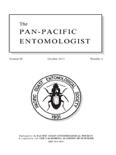
PAN-PACIFIC ENTOMOLOGIST
Championing Insect Research for a Sustainable FuturePAN-PACIFIC ENTOMOLOGIST, published by the PACIFIC COAST ENTOMOLOGICAL SOCIETY, serves as a pivotal platform for disseminating research in the field of entomology, encompassing a variety of topics related to insects and their interactions within ecosystems. Operating under the ISSN 0031-0603 and E-ISSN 2162-0237, this esteemed journal has been committed to advancing our understanding of insect science since its initial publication in 1993, with coverage extending to 2024. Notably categorized in the Q4 quartile of the insect science category and ranked in the 5th percentile of Scopus, PAN-PACIFIC ENTOMOLOGIST offers a unique opportunity for scholars, professionals, and students to engage with cutting-edge research and contribute to the scientific dialogue within this specialized field. While currently not open access, the journal is dedicated to the dissemination of empirical studies, reviews, and short communications that elucidate the crucial roles insects play in agriculture, ecology, and public health. Situated in the heart of San Francisco, California, this journal not only enriches the academic community but also promotes a deeper appreciation for the diverse and often under-appreciated world of entomology.

COLEOPTERISTS BULLETIN
Diving Deep into Beetle Biology and EcologyCOLEOPTERISTS BULLETIN is a pivotal journal in the field of insect science, particularly focusing on the fascinating world of beetles. Published by the COLEOPTERISTS SOC, this journal disseminates high-quality research, illustrations, and literature reviews since its inception, with contributions spanning from 1988 to 2024. Though classified in Q3 of the insect science category as per the 2023 quartiles, it holds significant value for researchers, professionals, and students alike, offering insights into agricultural and biological sciences with an emphasis on coleopteran diversity and ecology. Based in the United States at the University of Georgia, this journal serves as a hub for scientific dialogue and advancements in the field. While it currently does not offer open access, its rigorously peer-reviewed articles ensure that cutting-edge research reaches a dedicated audience, promoting a deeper understanding of beetles' ecological roles and contributions to biodiversity.
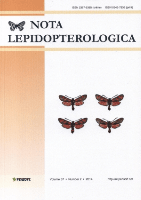
NOTA LEPIDOPTEROLOGICA
Connecting researchers to the wonders of insect science.NOTA LEPIDOPTEROLOGICA, an esteemed journal published by Pensoft Publishers, has been a cornerstone in the fields of Insect Science, Animal Science, Ecology, and Evolution since its inception in 1995, with a commitment to open access publication since 2014. Based in Sofia, Bulgaria, this journal serves as a vital platform for researchers and professionals alike, facilitating the dissemination of significant findings related to Lepidoptera and broader ecological interactions. With an impressive scope covering vital aspects of biodiversity and taxonomy, NOTA LEPIDOPTEROLOGICA holds a Q3 ranking in its categories according to the 2023 metrics and plays a crucial role in advancing our understanding of insect science. By fostering international collaboration among scholars, the journal not only emphasizes the ecological importance of Lepidoptera but also contributes to global conservation efforts, making it an indispensable resource for students and experienced researchers aiming to deepen their knowledge in these fields.

RUSSIAN JOURNAL OF HERPETOLOGY
Fostering Insights into Reptilian and Amphibian LifeRUSSIAN JOURNAL OF HERPETOLOGY is a prominent scholarly publication dedicated to the field of herpetology, focusing on the study of reptiles and amphibians. Published by FOLIUM PUBL CO in the Russian Federation, this journal aims to foster the exchange of knowledge and research in animal science, ecology, evolution, and behavior. With its ISSN 1026-2296 and a significant commitment to high-quality academic discourse, the journal maintains a respectable standing within the Q3 quartile in both Animal Science and Zoology, as well as in Ecology, Evolution, Behavior, and Systematics. This attributes to its Scopus rank among leading journals in related fields, enhancing its visibility and influence. Spanning from 2014 through 2024, it publishes rigorous research that explores the diversity, biology, and conservation of herpetofauna, making it a vital resource for researchers, professionals, and students alike who are invested in the ecological and evolutionary dynamics of these species.
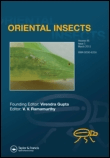
ORIENTAL INSECTS
Illuminating the Wonders of Oriental InsectsORIENTAL INSECTS is a distinguished journal dedicated to advancing the field of Insect Science, published by the reputable Taylor & Francis Ltd. With its long-standing history since 1967, this journal provides a platform for innovative research focused specifically on the diverse insect fauna of the Oriental region, encompassing topics such as taxonomy, ecology, physiology, and behavior. The journal is indexed with an ISSN of 0030-5316 and an E-ISSN of 2157-8745, making it easily accessible to a global audience. Although it currently does not operate under an Open Access model, its rigorous peer-review process ensures the dissemination of high-quality research. As a Q4 journal in the Insect Science category for 2023 and ranked 103 out of 181 in Scopus, ORIENTAL INSECTS remains a vital resource for researchers, professionals, and students seeking to enhance their understanding of insect biodiversity and conservation. Located in the United Kingdom, it is committed to promoting the latest scientific findings and fostering collaboration among entomologists worldwide, contributing significantly to the academic community.

Austral Entomology
Bridging Research and Real-World ApplicationsAustral Entomology, published by Wiley, is a leading journal in the field of entomology, specializing in the study of insects within the wider context of agronomy, ecology, and evolutionary biology. With an impact factor that reflects its growing influence and a commendable H-Index, this journal serves a vital role in disseminating cutting-edge research that bridges the gap between basic entomological studies and applied agricultural practices. Since its inception in 2014, Austral Entomology has maintained a strong commitment to open access, fostering a collaborative environment for researchers and practitioners. Recognized within category quartiles Q2 across multiple fields such as Agronomy and Crop Science and Ecology, it ranks impressively among journals in Insect Science, showcasing the significance of its contributions to understanding insect behavior, ecology, and systematics. Given its robust accessibility options, the journal not only enhances the visibility of entomological research but also empowers professionals and students alike to engage with and apply findings in real-world contexts.
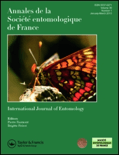
ANNALES DE LA SOCIETE ENTOMOLOGIQUE DE FRANCE
Illuminating the ecological significance of insects.ANNALES DE LA SOCIETE ENTOMOLOGIQUE DE FRANCE, published by Taylor & Francis Ltd, is a prestigious journal that focuses on the dynamic field of entomology, offering a platform for the dissemination of innovative research related to insect science and ecological systems. With an increasing impact factor and notable quartile rankings (Q2 in both Ecology, Evolution, Behavior and Systematics, and Insect Science), the journal serves as a vital resource for researchers, professionals, and students alike, stimulating advances in our understanding of insect biology and its implications for broader ecological contexts. Although it is not an Open Access journal, it boasts a strong reputation within the academic community, as evidenced by its significant Scopus rankings and a commitment to high-quality peer-reviewed content. With its extensive historical archive since 1988 and a continuous publication schedule through 2024, ANNALES DE LA SOCIETE ENTOMOLOGIQUE DE FRANCE remains an essential reference for those engaged in the study of entomology and related ecological fields. For more information, visit the publisher's site at Taylor & Francis Ltd.

ACTA ENTOMOLOGICA MUSEI NATIONALIS PRAGAE
Connecting Scholars in the Study of EntomologyACTA ENTOMOLOGICA MUSEI NATIONALIS PRAGAE, published by the esteemed NARODNI MUZEUM - PRIRODOVECKE MUZEUM in the Czech Republic, is an influential journal in the fields of Ecology, Evolution, Behavior and Systematics, as well as Insect Science. With an ISSN of 0374-1036 and an E-ISSN of 1804-6487, this journal has established itself as a vital resource for researchers, professionals, and students interested in the intricate world of entomology. Spanning publications from 2005 to 2024, it is recognized for its contributions to the understanding of insect biology, offering insights on ecological interactions and evolutionary relationships. Although it operates as a subscription-based platform, the journal maintains a respectable presence in scholarly circles, positioned in the Q2 quartile for both relevant categories in 2023. ACTA ENTOMOLOGICA serves not only as a repository of significant empirical findings but also as a discourse platform for emerging entomological concepts, making it an essential read for those involved in the biological sciences.

ACTA ZOOLOGICA ACADEMIAE SCIENTIARUM HUNGARICAE
Fostering Excellence in Zoological ResearchACTA ZOOLOGICA ACADEMIAE SCIENTIARUM HUNGARICAE, published by the Hungarian Natural History Museum, is a distinguished open access journal dedicated to advancing knowledge across the fields of Animal Science, Zoology, Ecology, Evolution, Behavior, and Systematics. Established in 2003 as an open access platform, this scholarly journal has actively contributed to the dissemination of critical research since 1996, positioning itself within the Q3 quartile in both its primary fields as of 2023. With its ISSN 1217-8837, ACTA ZOOLOGICA serves as a vital resource for researchers, professionals, and students aiming to explore and expand their understanding of animal biodiversity and ecology. Its publication features a variety of empirical studies, reviews, and critical commentaries that rigorously address contemporary issues in zoological sciences, underlining its commitment to fostering academic excellence and environmental sustainability. Researchers can access the journal’s extensive archives to deepen their inquiry into animal life, making it an essential addition to any academic library.
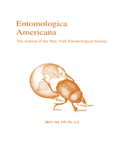
Entomologica Americana
Fostering Insights into Biodiversity and EcologyEntomologica Americana is a pivotal journal in the field of Insect Science, published by the esteemed New York Entomological Society Inc. With its ISSN (1947-5136) and E-ISSN (1947-5144), this journal serves as a critical resource for researchers, professionals, and students dedicated to the study of entomology. Although it is categorized in the Q4 quartile for Insect Science as per the 2023 Scopus Rankings, where it ranks 179 out of 181, it continues to provide valuable insights into various aspects of insect biology, ecology, and conservation. The journal has been actively publishing since its convergence years from 2009 to 2017, and in selected years thereafter, including 2019, 2021, and 2023. Located at the iconic American Museum of Natural History in New York City, Entomologica Americana is a testament to the ongoing exploration and understanding of the insect world that underpins biodiversity and ecosystem health. Although it does not operate under an Open Access model, it offers a vital platform for scholarly communication and the dissemination of research findings, making it indispensable for anyone involved in or entering the fascinating field of entomology.